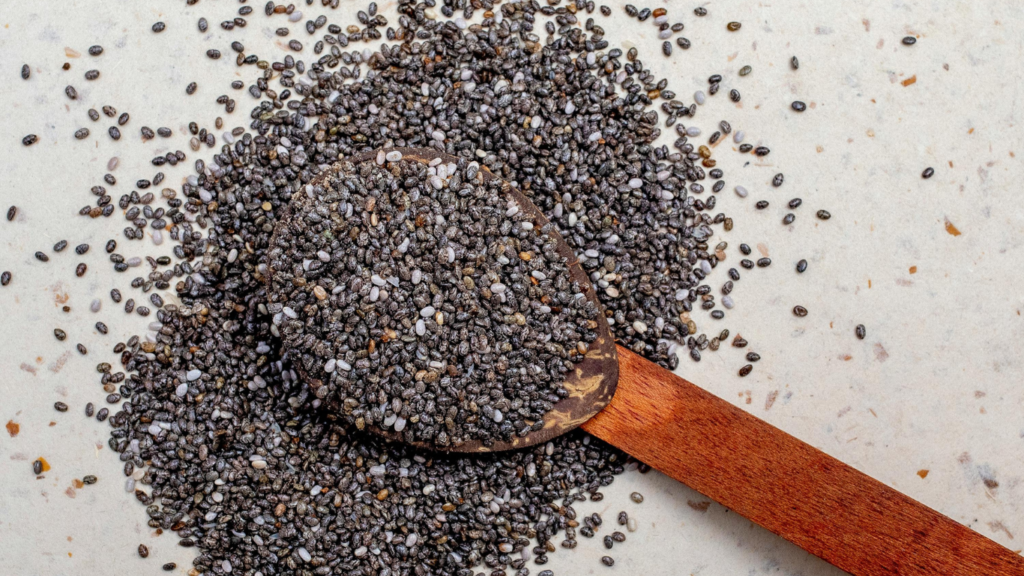Are chia seeds truly a superfood, or do they come with hidden side effects? While they offer health benefits like fiber, omega-3s, and antioxidants, excessive consumption may lead to digestive issues, choking risks, or blood sugar fluctuations.

Though chia seeds support weight loss and heart health, they can also cause bloating, constipation, or allergic reactions. Understanding both the benefits and risks is key to safe consumption.
So, should you eat chia seeds daily, or is moderation essential? Let’s explore the facts to find out.
Can Too Much Fiber from Chia Seeds Cause Digestive Problems?
🔹 Many people ask, “Can too much fiber from chia seeds cause digestive problems?” While chia seeds are rich in fiber, excessive consumption without enough water may lead to discomfort.
🔹 A study published in the Journal of Nutrition and Metabolism found that consuming large amounts of chia seeds can result in:
- Bloating
- Constipation
- Gas and stomach cramps
🔹 Expert Tip: Always soak chia seeds and drink plenty of water to prevent digestive discomfort.
🔹 Reference: Health Benefits of Chia Seeds – WebMD
Can Dry Chia Seeds Get Stuck in Your Throat? Doctor Warnings & Safe Ways to Eat Them
🔹 Many people wonder, “Can dry chia seeds get stuck in your throat?” The answer is yes—if consumed improperly, they can pose a serious choking risk.
🔹 According to the American Journal of Gastroenterology, chia seeds can absorb 10-12 times their weight in water, making them expand rapidly. This can lead to:
- Throat blockages
- Esophagus obstruction
- Difficulty swallowing, especially for those with pre-existing swallowing issues
🔹 Expert Warning: Dr. James Andrews, a leading nutritionist, cautions:
“Dry chia seeds should never be consumed alone. Always soak them first to avoid choking incidents.”
🔹 Reference: Watch It Grow: Esophageal Impaction With Chia Seeds
Can Chia Seeds Cause Allergies? Symptoms, Risks, and Expert Warnings
The European Journal of Allergy and Immunology reports a rise in chia seed allergies and cross-reactivity, particularly in individuals sensitive to other seeds or nuts. Symptoms may include:
- Skin rashes & itching from chia seeds
- Swelling of the face, lips, or tongue after eating chia seeds
- Difficulty breathing due to chia seed allergy (severe cases)
Those with existing seed or nut allergies should consult a doctor before trying chia seeds for health benefits to avoid potential allergic reactions.
Reference: Chia Seed Allergy and Cross-Reactivity – PubMed
Can Chia Seeds Affect Blood Pressure? Benefits and Risks for Heart Health and Hypertension
🔹 A joint study from researchers in Iraq and Iran found that chia seeds may help lower blood pressure naturally, making them beneficial for individuals with high blood pressure and heart disease. However, their effects may not be suitable for everyone.
🔹 Research suggests that chia seeds and blood pressure are linked in the following ways:
- Chia seeds for heart health can support cardiovascular function due to their high omega-3 and fiber content.
- Chia seeds and blood pressure medication may interact, posing risks for those on blood thinners by enhancing anticoagulant effects.
- Chia seeds for hypertension management could be useful, but should be consumed with caution by those taking medication.
- Are chia seeds safe for people with low blood pressure? Those with hypotension should consult a doctor before consuming them regularly.
🔹 If you’re on anticoagulants, blood pressure medication, or have low blood pressure, consult your doctor before adding chia seeds for heart health and blood circulation to your diet to avoid potential health risks.
🔹 Reference: The Effect of Chia Seed on Blood Pressure and Metabolic Profiles – PubMed
Can Chia Seeds Help Regulate Blood Sugar, or Do They Pose Risks for Diabetics?
🔹 While chia seeds for blood sugar control are often recommended, a study in Diabetes Research and Clinical Practice found that they may also pose risks for individuals with diabetes or insulin resistance.
🔹 Research suggests that chia seeds and blood sugar levels are linked in the following ways:
- May help regulate blood sugar naturally by slowing carbohydrate absorption
- Can lower blood sugar too much in diabetic patients taking medication
- Might interfere with insulin regulation, potentially leading to imbalances
- Could impact diabetes management when combined with certain medications
🔹 Expert Advice: People with diabetes or prediabetes should monitor their blood sugar levels when consuming chia seeds for diabetes to avoid unexpected drops.
🔹 Reference: Effect of Chia Seeds on Glycemic Control – PubMed
Do Chia Seeds Contain Anti-Nutrients? Effects on Mineral Absorption and Nutrient Deficiency
🔹 According to Harvard Medical School, chia seeds contain phytic acid, an anti-nutrient that can impact mineral absorption.
🔹 How chia seeds and phytic acid affect nutrient absorption:
- May reduce absorption of essential minerals like calcium, iron, and zinc
- Could lead to nutrient deficiencies over time if consumed in excess
- Might impact bone health and immune function due to lower mineral availability
🔹 How to balance anti-nutrients in chia seeds? Pair them with vitamin C-rich foods like lemon, berries, or bell peppers to enhance mineral absorption.
🔹 Reference: Harvard Health: Phytic Acid and Nutrient Absorption
✅ Safe Ways to Eat Chia Seeds: Expert Recommendations
To reduce the risks of chia seeds and maximize their benefits, experts suggest the following precautions:
✅ Soak chia seeds before eating to prevent choking and enhance digestion.
✅ Limit intake to 1-2 tablespoons per day to avoid digestive issues and calorie overload.
✅ Drink plenty of water to support digestion and prevent bloating or constipation.
✅ Monitor blood sugar levels if you have diabetes, as chia seeds may lower glucose levels.
✅ Consult a doctor if you’re on blood thinners or have low blood pressure.
By following these chia seed safety tips, you can enjoy their health benefits without unwanted side effects.
✅ Conclusion: Should You Still Eat Chia Seeds?
Chia seeds provide numerous health benefits, including improved digestion, heart health, and blood sugar regulation. However, recent research highlights potential risks, such as digestive discomfort, blood sugar fluctuations, and interactions with medications.
✅ The key to safe consumption is moderation and proper preparation. Soaking chia seeds, staying hydrated, and controlling portion sizes can help you enjoy their benefits without unwanted side effects.
When consumed correctly, chia seeds remain a powerful superfood and a valuable addition to a balanced, healthy diet.
CLICK HERE TO READ US ON QUORA
YOUR NEEDS 😉
Click any tool below to explore and calculate instantly!


